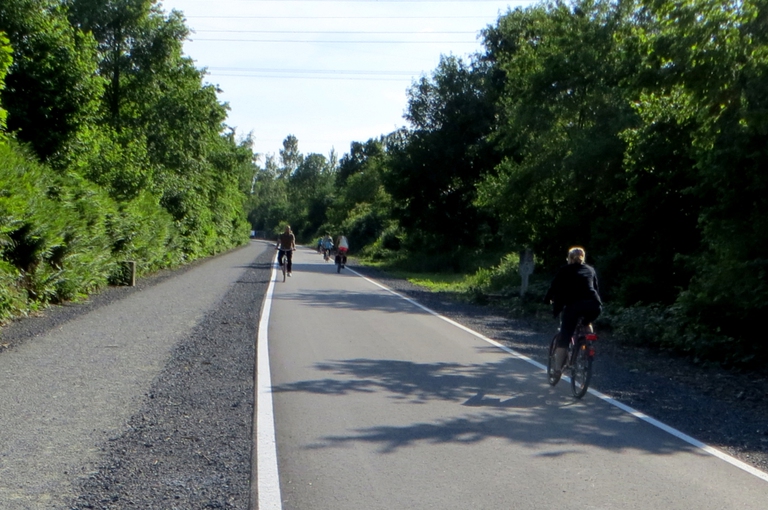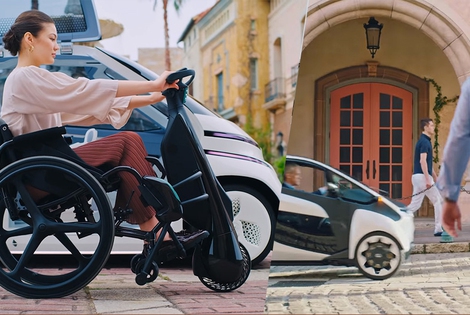
Milan has announced one of Europe’s most ambitious mobility schemes, known as Strade Aperte (open roads). Its goal is to reduce cars in phase 2 of the lockdown by increasing bike lanes and pedestrian areas.
Germany has decided to go one step further and, instead of opting for traditional cycling lanes, has chosen to build highways open to cyclists. Bicycles are becoming alternative and competitive means of transport in cities, which are also more and more traffic-congested, resulting in stressful driving conditions. But in case you want to move from
Germany has decided to go one step further and, instead of opting for traditional cycling lanes, has chosen to build highways open to cyclists. Bicycles are becoming alternative and competitive means of transport in cities, which are also more and more traffic-congested, resulting in stressful driving conditions. But in case you want to move from one city to another in order to visit a new place, go to work or enjoy a bike ride with your family, it is extremely useful to have long-distance routes open to cyclists.
With this aim in mind, the metropolitan region of the Ruhr confirmed it will build Germany’s first highway for bikes, broadening the concept of cycling routes – in multiple senses.
The Rs1 will connect Duisburg to Hamm via ten other cities including Dortmund, Bochum and Essen. A fast route using abandoned railway lines and canals that will be as long as 100 kilometres and will be well integrated with an existing network of cycling lanes.
The first tract of the highways for cyclists in the area of Mülheim was opened in November 2015, and is five kilometres long and six metres wide. Covering the former railway line “Rheinische Bahn” it will be as long as 21 kilometres and will connect the University of Essen to Rheinpark Duisburg.
The bike highway (Radschnellweg, in German) will be four metres wide, plus two metres for pedestrians: its width, lighting and winter maintenance will become standards for further projects.
This project may change the way bicycles are used: they can be means of transport for riding long distances and can be useful for commuters, students as well as so-called Sunday cyclists and tourists who decide to visit new cities on a bike.
Siamo anche su WhatsApp. Segui il canale ufficiale LifeGate per restare aggiornata, aggiornato sulle ultime notizie e sulle nostre attività.
![]()
Quest'opera è distribuita con Licenza Creative Commons Attribuzione - Non commerciale - Non opere derivate 4.0 Internazionale.
Milan has announced one of Europe’s most ambitious mobility schemes, known as Strade Aperte (open roads). Its goal is to reduce cars in phase 2 of the lockdown by increasing bike lanes and pedestrian areas.
Formula 1, the world’s most important auto racing championship, has decided to turn the page and aim for carbon neutrality with the support of its teams, drivers and the whole racing circus.
Toyota and LifeGate began telling the story of hybrid mobility back in 2006, now, on the road to the Tokyo 2020 Olympics, they’re still treading the path of sustainable mobility. Here are the main steps of the journey.
Germany’s first solar bicycle lane could be the prototype for the roads of the future. The photovoltaic tiles melt snow and ice, and are capable of absorbing noise.
The Vespa is back in an electric version. Production has just started and the first models can be reserved online starting from October.
The city of Utrecht, in the Netherlands, is home to a bridge for cycling and walking that stretches over roof garden of a Montessori school. This project enhances practicality and will allow families to bring children to school by bike, passing through green areas. Despite their functionality, bridges are often seen as an infrastructure that is
The Lego hair bike helmet is the latest Internet craze. For now it’s just a prototype but production on a large scale will probably start soon.
Just as fires often give way to new growth, after the Dieselgate scandal, which saw Volkswagen cheating on US emission rules, the German car manufacturer radically changed course, beginning to focus on sustainable mobility. The German car company aims to propose thirty zero-emission models and produce at least one million battery electric vehicles by 2025. An ambitious mission
Sustainable, two-wheel mobility is triumphing in Copenhagen. After years of investments, policies, and infrastructural changes, bikes now outnumber cars in the city centre. The website Copenhagenize has released data linked to the number of vehicles entering the city centre, which are monitored by the city’s administration on a daily basis. Last year, 265,700 bikes have entered








